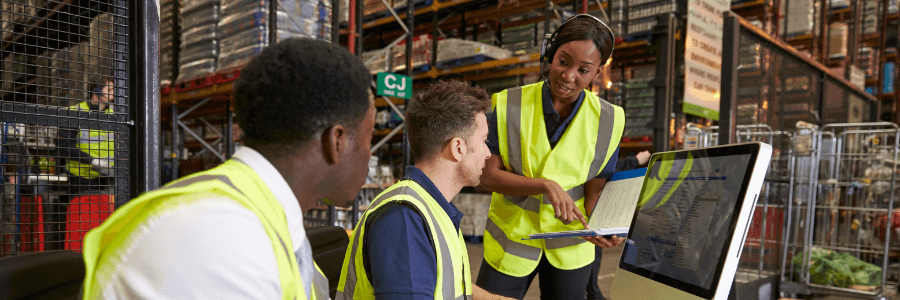Addressing Common HR Compliance Issues for a Remote Workforce

Quick look: Out of sight doesn’t mean out of mind when it comes to workplace compliance. Though the benefit of remote working serves as a recruiting and retention advantage, there are several issues businesses must be prepared to address. Therefore, employers should look to HR solutions equipped to handle the balance of keeping their companies protected and their workforce happy.
The trend of remote working has become the norm for many small- and medium-sized businesses (SMBs) much to the delight of employees. People enjoy a non-existent commute, better work-life balance, and increased autonomy over their productivity, all of which is available with an out-of-office setup. Nearly 25% of all U.S. professional jobs are expected to be fully remote by the end of 2022 with predictions of 50% of jobs going fully remote in the near future.
However, with this type of arrangement, there are a few common compliance issues bound to arise, including payroll, taxes, and workplace safety, especially as a company grows. Here’s how to navigate a remote workforce and why a professional employer organization (PEO) is often the desired HR solution.
Payroll
Employee classification and wage law differences make handling a remote workforce tricky. Non-exempt employees working from home may have difficulty accurately tracking time. Some employees may struggle with identifying a clear line between where work and life responsibilities begin and end, although regardless, they are entitled to compensation for all work. It’s an employer’s responsibility to ensure they’re paid accurately.
Also, wage laws vary by state (and sometimes city) which can make it difficult to track if there are employees working in different locations. SMBs may be required to follow payroll laws in states where work is actually being performed versus where the business is located for employees who work remotely extensively outside of the business’s home state.
Keeping track of updates and employment changes (transitioning from non-exempt to exempt, location to location, etc.) can be the biggest challenge. Organization is essential to maintaining mistake-free payroll. It’s helpful for SMB employers to:
- Implement payroll software with a timekeeping tool
- Ensure employees are accurately classified as per HR policies
- Keep a current employee list with the most up-to-date contact information, working location, employee classification, and minimum wage requirements
SMB leaders should communicate to their employees the importance of being forthcoming with regard to their remote work setups. Any changes made to employee status, whether it’s the state they’re working in or how they’re classified, will affect payroll and must be updated immediately. Every detail is necessary to maintain compliance.
Taxes
In addition to the complexities concerning payroll, HR compliance also involves compliance with regard to taxes. In the modern-day, dispersed workforce, it’s not uncommon for employees to live and work in different states, each of which follows its own tax laws. Therefore, remote working introduces a new set of challenges to ensure deductions are accurate.
Furthermore, there are also separate city and local tax laws which may apply. These, too, can change from year to year, which makes managing risk and compliance increasingly complex. It’s important for employers to understand all labor law requirements for the state their employees are working in and make the necessary adjustments as statuses change.
Workplace safety
Even when working from home, in most cases, workers’ compensation is still applicable. The Occupational Safety and Health Administration has updated its regulations to include remote employee environments. A work environment is defined as “the establishment of other locations where one or more employees are working or are present as a condition of their employment.” This isn’t limited to physical locations. It also includes any “equipment or materials used by the employee during the course of his or her work.”
Plus, SMB employers need to consider digital safety and cyberattack prevention. Work policies should include expectations of work-related activities, security guidelines, and how these apply regardless of location. It’s helpful for employers to provide ongoing education to promote safe and healthy working environments, as well as employee stipends to allow for secure at-home workstations.
How SMBs can be proactive with the help of a PEO
Being proactive with communication highlights the value of remote working rather than being discouraged by challenges. Encouraging collaboration remains critical even with a dispersed workforce. Thanks to the advances in modern technology, workplace collaboration can still be effective regardless of different time zones and workspaces. Video conferencing and screen sharing, version-control shared documents, and digital messaging tools designed for the office can all help keep employees connected even when they’re not in the same room.
Meanwhile, using these communication methods to share resources helps everyone stay well-informed on remote working policies and best practices. It also ensures all employees are equipped with the tools and software they need to perform their jobs at home. Due to these types of changes, comprehensive HR solutions now include guidance on creating remote work policies.
Remote work policies should be clearly communicated with set expectations for current employees as well as during the onboarding process. It’s important to outline specifics rather than make assumptions about comprehension. This provides transparency while also protecting a company’s best interests. Policies should cover areas such as:
- Time tracking protocols
- Defining at-home work environments
- Safe and healthy work requirements
- Employee classification
- Virtual behavior standards
- Anti-harassment and discrimination policies
- Multi-state tax obligations
It requires a full-time effort to keep up with everything HR entails. Working with a PEO helps SMBs maintain HR compliance and administrative responsibilities so business leaders can better focus on company growth. ExtensisHR’s all-encompassing HR solution includes HR, payroll, benefits, and compliance services tailored to meet each company’s unique goals.
Remote work has fundamentally reshaped how businesses perform. And this type of shift doesn’t come without a steep learning curve. Our dedicated team of HR experts has the knowledge, experience, and flexibility to adapt to your changing business needs. Contact ExtensisHR today.



